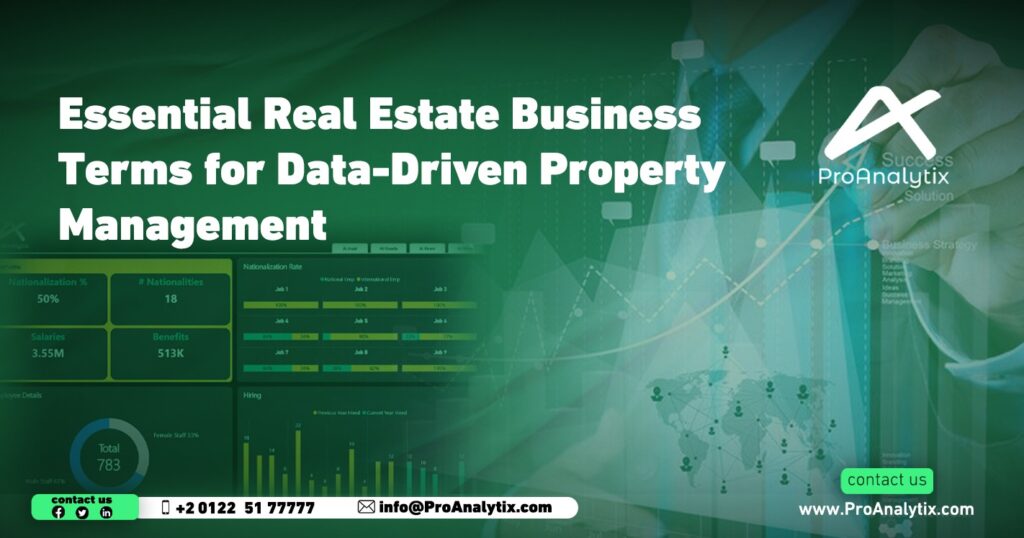In Saudi Arabia’s fast-evolving real estate market, data-driven decision-making is essential for property managers and investors looking to maximize their investments. By understanding and leveraging key real estate business terms—especially those related to financial reporting and data analysis—real estate professionals can make informed decisions, streamline operations, and enhance profitability. Here’s a comprehensive breakdown of essential real estate terms to help you navigate the industry with confidence.
Fundamental Real Estate Terms in Property Management
To effectively manage properties, it’s crucial to understand these foundational real estate terms:
- Appreciation: The increase in a property’s value over time due to factors like demand, location improvements, and market conditions.
- Depreciation: The decrease in property value over time, often due to wear and tear, market downturns, or obsolescence.
- Equity: The owner’s financial stake in a property, calculated by subtracting the mortgage or other debts from the property’s current value.
- Fair Market Value: The estimated price a property would sell for in an open market, considering factors like demand, location, and property condition.
- Mortgage: A loan secured by real estate, where the property acts as collateral until the loan is paid off.
- Title Deed: A legal document that proves ownership of the property and is essential in all property transactions in Saudi Arabia.
By mastering these terms, property managers and investors can better assess property values, manage investments, and navigate the Saudi real estate market with clarity.
Key Real Estate Management and Financial Reporting Terms
Financial management is the backbone of successful property management. Here are critical terms to know:
- Income Statement: A financial report showing a property’s revenue and expenses over a specific period, helping in assessing profitability.
- Balance Sheet: A snapshot of a property’s financial position, detailing assets, liabilities, and equity. It provides insights into the property’s financial health.
- Cash Flow Statement: A statement that shows cash inflows (e.g., rental income) and outflows (e.g., maintenance costs), crucial for monitoring liquidity.
- Property Operating Expenses (OPEX): Ongoing expenses required to manage a property, including property taxes, insurance, maintenance, and utilities.
- Capital Expenditures (CapEx): Investments made to improve or replace property assets, like renovations or major repairs, aimed at enhancing property value.
- Net Operating Income (NOI): A property’s revenue after deducting operating expenses. NOI is used to assess the property’s profitability.
- Capitalization Rate (Cap Rate): The ratio of NOI to the property’s current market value, helping investors gauge the potential return on investment.
- Internal Rate of Return (IRR): A measure of the profitability of an investment, accounting for the time value of money.
- Return on Investment (ROI): A metric that evaluates the performance of an investment, calculated by dividing net profit by the initial investment cost.
For real estate investors and managers in Saudi Arabia, understanding these terms is crucial to evaluating financial performance and making data-driven investment decisions.
Essential Data Analysis Metrics for Real Estate Reporting
As Saudi Arabia’s real estate sector becomes more competitive, the ability to analyze data is vital. Here are key data analysis terms to empower real estate professionals:
- Data Mining: The process of discovering patterns in large datasets, helping managers identify trends, forecast demands, and make informed decisions.
- Predictive Analytics: Using historical data to forecast future real estate trends, such as property demand, rental rates, and occupancy.
- Market Analysis: A comprehensive assessment of real estate market conditions to determine the viability of property investments.
- Comparative Market Analysis (CMA): The process of evaluating similar properties to determine a property’s market value, helping investors make competitive offers.
- Geographic Information Systems (GIS): Technology that analyzes spatial data, enabling better decisions based on location insights.
- Property Valuation Models: Techniques used to estimate a property’s value, essential for setting rental rates, selling prices, and investment strategies.
- Rental Yield: A calculation of annual rental income as a percentage of the property’s value, helping investors assess potential returns.
- Occupancy Rate: The percentage of occupied rental units in a property, used to gauge performance and profitability.
Why Data-Driven Real Estate Management Matters in Saudi Arabia?
In a market as dynamic as Saudi Arabia’s, leveraging these data-driven management terms is essential. By applying these insights, property managers can improve efficiency, optimize operational costs, and enhance returns on investment. As the Kingdom continues its economic diversification and growth, having a solid understanding of these real estate and data analysis terms will position real estate professionals for success.
Boost Your Real Estate Success with ProAnalytix’s Data Analytics Solutions
ProAnalytix is here to support Saudi Arabian real estate professionals in making informed, data-backed decisions. Our customized data analytics services can help you implement effective property valuation models, forecast market trends, and optimize your operation management.
contact us for a free consultation: https://www.proanalytix.com/booking/

